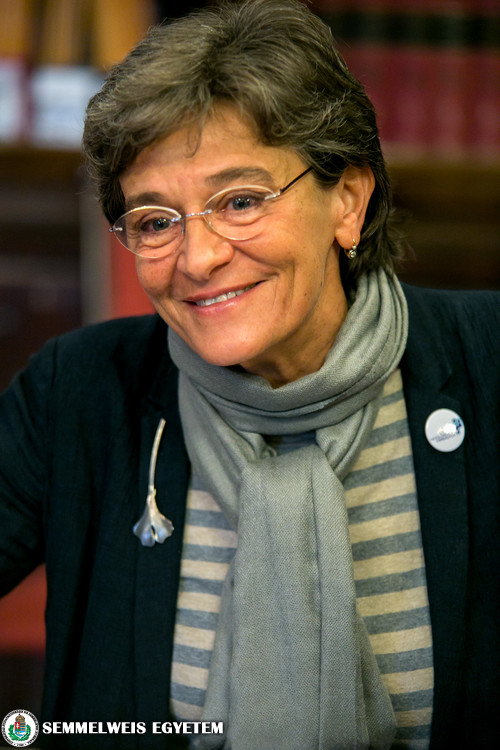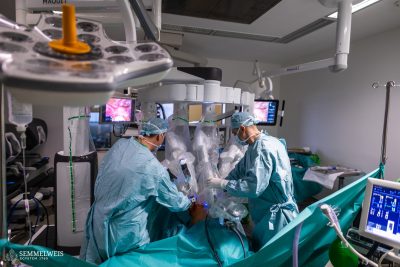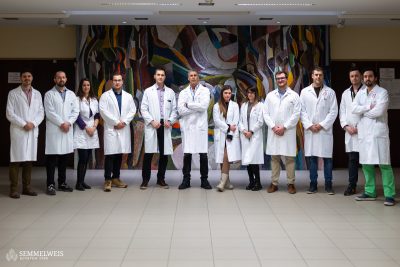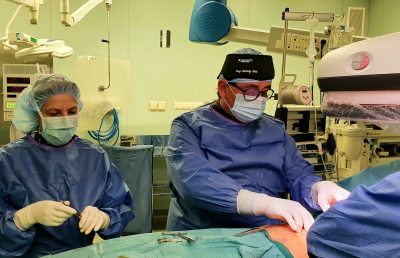A scientific paper written in an international collaboration with the involvement of Semmelweis University’s researchers and published in the scientific journal Nature Communications describes the phylogenesis of breast tumours types and their metastases, which may help establish the correct treatment order of the primary tumour and the metastases. The paper was written with the involvement of Semmelweis University’s 2nd Department Pathology and the Cancer Centre and one of its authors is Dr. Borbála Székely, an oncology resident, who joined the research as a PhD student of Dr. Janina Kulka.
 Dr. Janina Kulka, Deputy Director of the 2nd Department of Pathology has been studying the connection between breast tumours and their metastases for over a decade.
Dr. Janina Kulka, Deputy Director of the 2nd Department of Pathology has been studying the connection between breast tumours and their metastases for over a decade.
“It has been long observed and proved by various independent studies that several differences can be identified between primary and metastatic tumours. This meant a breakthrough in the treatment of tumours, as earlier all cancer patients had received the same therapy. Today however, in case of metastatic breast cancer, the identification of the parameters forming the basis of the therapy needs to be derived from the metastasis.”, Dr. Janina Kulka said.
The paper published in Nature is the result of an in-depth research series. Dr. Borbála Székely, who is an oncology resident and currently spending a year of scholarship at Yale University, started to work together with Dr. Janina Kulka as a PhD student. They gathered nearly 60 cases from the autopsy archives including histological descriptions of primary and metastatic tumours and the patients’ clinical history. Dr. Borbála Székely spent half a year in the USA at the MD Anderson Cancer Center with a scholarship, where she worked together with Dr. Lajossal Pusztai. He put her in contact with Dr. Christine Desmedt, researcher of the Institut Jules Bordet in Brussels who was conducting similar studies.
“The beginning of the new cooperation was a turning point in the research as we had the opportunity to sum up the results so far and set up a plan for further studies. Finally, we chose 10 out of those 60 cases which from the basis of the scientific paper.”, said Dr. Janina Kulka.

The research results were published online in Nature Communications in April and in print in May. The paper discusses the phylogenesis of tumours, creating a kind of family tree. The description of the phylogenesis enabled the identification of the differences between primary and metastatic tumours and the different processes of metastatisation.
“We managed to identify the so-called metastatic cascade originating from metastatic progenitor cells, heterogenous metastatisation deriving from different clones of heterogenous primary tumours and ‘horizontal’ metastatisation, which is the metastasis of metastasis. Based on the conclusions of the 10 cases it is worth removing the primary tumour before further metastatisation takes place only in case of bone metastasis.On the other hand, in case of oligometastatic cancers (those with few metastsases) the removal of the metastases may have a favourable impact on disease evolution.We also observed that the later metastatisation takes place the more diverse it will be from the primary tumour.”, Dr. Janina Kulka said.
 The above examples prove that the research results have practical value in clinical practice as well. The cooperation benefited from the high autopsy rate in Hungary, as the foreign institutions barely conduct postmortem examinations. It was the cornerstone of this research by providing the researchers with a vast amount of data.
The above examples prove that the research results have practical value in clinical practice as well. The cooperation benefited from the high autopsy rate in Hungary, as the foreign institutions barely conduct postmortem examinations. It was the cornerstone of this research by providing the researchers with a vast amount of data.
The authors of the paper titled Phylogenetic analysis of metastatic progression in breast cancer using somatic mutations and copy number aberrations include Dr. Borbála Székely, Dr. Marcell Szász A., Dr. Magdolna Dank, Dr. Gyöngyvér Szentmártoni, Dr. Anna-Mária Tőkés from Semmelweis University and Zsófia Nagy I. and Zsófia Faragó, students from the Students’ Scientific Association. As an extension of the research studies are being conducted at the 2nd Department of Pathology on the differences between early and late metastatising breast cancer types.
Eszter Keresztes
Photo: Attila Kovács, Semmelweis University and Dr. Marcell Szász A.
Translation: Ágnes Raubinek


